The Roman Republic was founded in 509 BC after the overthrow of the Roman monarchy. The last king, Lucius Tarquinius Superbus, was expelled due to his tyranny, marking the end of royal rule in Rome.
The new Republic introduced a unique form of government where power was shared between elected officials and representative bodies. The Roman Senate became a central institution, guiding the Republic's decisions and policies.
Two consuls were elected annually to serve as the Republic's chief executives and military commanders. This dual-consul system prevented any single individual from gaining excessive power, reflecting the Republic's anti-monarchial principles.

Rome's early Republic faced numerous challenges, including external threats from neighboring tribes and internal conflicts between the patricians (aristocratic elites) and plebeians (common citizens). These struggles led to significant reforms, such as the creation of the Tribunes of the Plebs to protect the rights of ordinary citizens.

The Roman Republic's expansionist policies brought it into contact with other civilizations, fostering trade and cultural exchange. Its disciplined military and innovative governance contributed to its growth into a powerful city-state and later, an empire.

The founding of the Roman Republic laid the groundwork for a political system that influenced later civilizations. It remains a key chapter in history, embodying ideas of citizenship, rule of law, and shared governance.